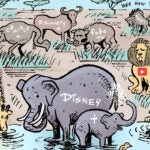“Data-Driven Thinking” is written by members of the media community and contains fresh ideas on the digital revolution in media.
Today’s column is written by Alain Portmann, partner and head of strategy and insights at House of Kaizen.
McDonald’s decision to appoint Omnicom to its US creative account, on the basis of a pay-per-performance component, was widely covered.
Though it is a big first for one of the world’s truly global brands, the reality is that there is nothing innovative about the model itself. Independent agencies have been working on this basis for years, managing complex objectives, geographies and multiple channels.
The other reality is that network agencies are reluctant to talk about pay-per-performance agreements with clients and the wider industry. Aside from the understandable confidentiality required with clients’ work, there is a more significant factor. Network agencies struggle with pay-per-performance models.
Network media agencies struggle with global performance models because financially they operate in silos lacking a shared profit-and-loss structure by country, limiting their ability to pull in specialist media capabilities to better serve their clients, without those teams competing financially. Network agencies’ solution to managing complex performance client relationships is to create bespoke agencies in bespoke locations to service specific client relationships.
The problem with these is that they are islands. The concept of creating a “speedboat agency” that can operate more dynamically than the “oil tanker network agency” is a good one, and an idea most clients love.
However, the sustainability, success and efficiency of these is questionable. The first factor is that it fosters separation. Separation goes against the value of an agency ecosystem collective, best practices and learnings across clients and industries. The second factor is internal politics. The separate entity must still report to and rely on the mothership; separating a client team from the larger organization does not make them independent. It is more about perception than substance.
A few years ago I was part of a team that set up a separate entity to manage a global client that worked on a strict pay-per-performance model. While the separate group consistently exceeded its clients’ targets, it required significant oversight and a different type of senior resource rarely found in agencies – entrepreneurial and commercially savvy – which did not benefit the organization as a whole.
Based on learnings gleaned from that experience, it was clear that the latest performance-based client relationship should sit squarely in the middle of the agency where this entrepreneurial, commercially savvy specialist resource was integrated into the overall agency, as opposed to being isolated.
This experience showed that isolating specialist resources wasn’t effective and that a new role was required to help specialists and the rest of the agency work together. Instead of traditional account directors or businesses partners, who focus mostly on the politics of the account and nurturing the client relationship, we trained and deployed integrators, who were both specialists yet commercially minded, and brought in resources as required. These integrators are affectionately referred to as “unicorns” given they are a rare breed. It forced the team to become more efficient, integrated and collaborative.
Despite the challenges, some holding companies have found some success in creating bespoke agencies. GTB, formerly known as Team Ford, is a good example, and WPP has also set up pay-per-performance models for a handful of other clients.
Pay-per-performance models benefit agencies and brands by aligning efforts to financial gain. While agencies might have to invest heavily at the beginning, the balance of accounts can be lucrative for an agency delivering scalable, efficient and strategic solutions for brands. The second benefit is a relationship based on commercial partnership as opposed to the delivery of services on which client procurement teams struggle to place a value.
Pay-per-performance models cannot succeed or be negotiated solely on the basis of multichannel media alone, requiring proven specialist capabilities in site conversation rate optimization and customer relationship management (CRM). Dentsu’s recent acquisition of Merkle – one of the largest CRM agencies in the US – points to the effort in filling the “conversion gap.”
The growing popularity of pay-per-performance models is beneficial to the industry and while it might make senior executives at network agencies uncomfortable, they are here to stay.
Follow House of Kaizen (@houseofkaizen) and AdExchanger (@adexchanger) on Twitter.













